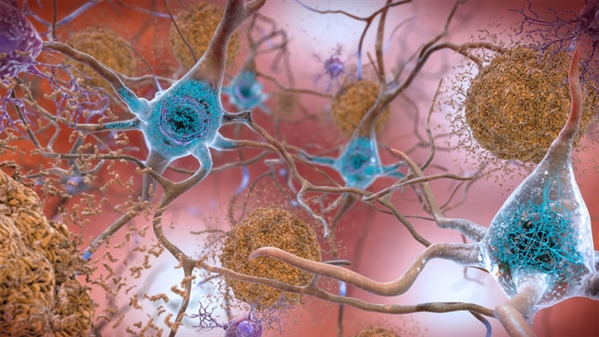New drug for Alzheimer's disease gives hope
New drug for Alzheimer's disease gives hope
August 09, 2018 Source: Chinese Journal of Science and Technology
Window._bd_share_config={ "common":{ "bdSnsKey":{ },"bdText":"","bdMini":"2","bdMiniList":false,"bdPic":"","bdStyle":" 0","bdSize":"16"},"share":{ }};with(document)0[(getElementsByTagName('head')[0]||body).appendChild(createElement('script')) .src='http://bdimg.share.baidu.com/static/api/js/share.js?v=89860593.js?cdnversion='+~(-new Date()/36e5)];
A new antibody drug removes protein plaques that form in the brain of Alzheimer's patients. Image source: NATIONAL INSTITUTE ON AGING
Even a little bit of success can be exciting in the search for drugs to treat Alzheimer's disease. This explains why a pilot drug called BAN2401 has received such attention at the recent Alzheimer's Association International Conference in Chicago, USA. Just a few months ago, BAN2401 also seemed to be joining the growing army of failed drug candidates.
In the Phase II trial, the drug did not show that its developers—Biogen, Cambridge, Mass., and Eisai, Inc., Japan—are setting the treatment for the primary endpoint. But at the meeting, the two companies presented a series of other analysis results from the same experiment. Studies have shown that BAN2401 may delay the rate of cognitive decline in Alzheimer's patients and reverse the accumulation of a brain protein thought to drive neurodegeneration in patients. However, there are relatively few patients who exhibit these effects – only 161. At the same time, the unexpected changes in the randomization of the study led to some doubts about the results. In the eyes of many people, the latest findings are too junior and not worth celebrating.
"If the results we see today also appear in Phase III clinical trials, it turns out that drugs have been found to improve the condition. This will also be the first drug to treat Alzheimer's disease." Alzheimer Keith Fargo, director of science projects and promotion at the Association for Diseases, said, "But you don't know if they will work until they are actually confirmed in the third phase of the trial."
Like several other Alzheimer's drugs under development, BAN2401 targets a protein fragment that forms a sticky plaque near the neuron, beta-amyloid. Many scientists believe that beta-amyloid is the chief culprit in Alzheimer's disease - preventing communication between neurons and eventually killing them. BAN2401 is an antibody that helps clear the beta-amyloid structure known as fibrils. The fibrils are in the process of agglomerating to form plaques.
The trial included 856 patients with mild, early Alzheimer's disease and relied on a new cognitive function measurement, the Alzheimer's Syndrome Score (ADCOMS). This indicator is designed to detect small changes experienced by patients with early stage Alzheimer's disease. The two companies also selected a complex and innovative research design. The trial was "adaptive" and instead of randomly assigning participants to 5 treatment groups (each obtaining a different drug dose). This dispensing system increases the likelihood that a patient will receive the therapeutic dose that appears to be most effective when added to the study.
The researchers also relied on a statistical method called Bayesian statistics to analyze how different groups of patients responded to the drug during the trial, rather than waiting until the trial was completed before analyzing the data. This approach means giving researchers earlier hints as to whether the drug might work. Fargo said that this is the first time Bayesian statistics have been used in the Alzheimer's disease trial. “I think the company feels very good about this drug and feels that Bayesian analysis will make it possible to decide more quickly whether to conduct a phase III trial.â€
However, this strategy seems counterproductive. An early analysis of the patient's 12-month treatment should have shown that BAN2401 reduced cognitive decline by at least 25% at 80% compared with placebo. But according to Biogen and Eisai in December 2017, the drug did not cross this barrier. In contrast, Lynn Kramer, chief medical officer of the Eisai Neurology Department, explained at a meeting held a few days ago that the possibility was judged to be 64% - "relatively close".
However, after continuing to track these patients for six months, the two companies became much optimistic. They announced in early July that the drug had a significant effect on some patients. At the meeting, participants first learned about the magnitude of this effect: after 18 months, 161 patients who received the highest 5 doses were compared to those who received placebo, according to ADCOMS criteria. The recession has slowed by 30%. According to the more traditional cognitive measurement method known as the Alzheimer's Assessment Scale-Cognitive Subscale, the rate of cognitive decline in this group of patients was 47% slower than that of the placebo group. Brain imaging also showed that the drug reduced the level of amyloid plaques in all drug-administered groups. At the same time, 81% of the participants in the brain scan after 18 months of treatment were judged as "amyloid negative."
However, Kramer also described an unanticipated and potentially problematic change in the trial. Investigators monitored the degree of brain swelling in patients – a potential safety risk for this and other anti-amyloid antibodies, especially in patients with the APOE4 gene. This gene increases the risk of developing Alzheimer's disease and is associated with a more rapid cognitive decline. In July 2014, a regulatory agency outside the United States, which the company did not specify, requested that the trial stop assigning these APOE4 carriers to the group receiving the highest dose (and possibly the highest risk) treatment. The company complies with this requirement.
It is unclear what kind of research Biogen and Eisai will need to do next to confirm the effectiveness of the drug to the US Food and Drug Administration. Their follow-up will be part of several efforts to closely observe such drug candidates. At the same time, the two companies are jointly developing a different amyloid antibody, aducanumab. The study is expected to produce results in 2020. (Zonghua compilation)
Chinese Journal of Science (2018-08-07 3rd Edition International)
Metal Security Seals,Metal Bolt Seal,Metal Tamper Seals,Metal Truck Seals
Wenzhou Haoshi Light Industrial Products Co., LTD , https://www.economicseals.com